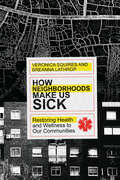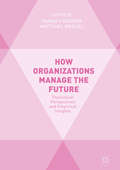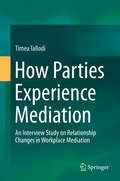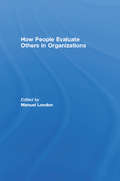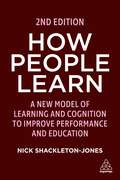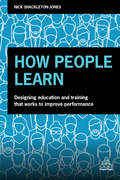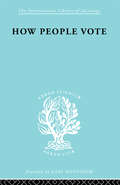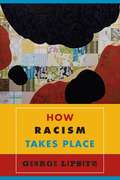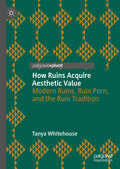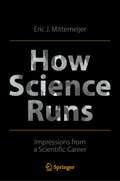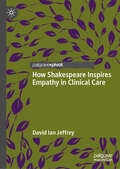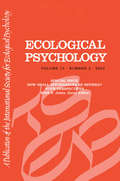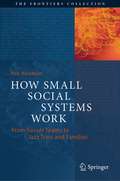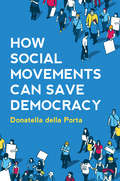- Table View
- List View
How Neighborhoods Make Us Sick: Restoring Health and Wellness to Our Communities
by Veronica Squires Breanna LathropOur neighborhoods are literally making us sick. Buildings with mold trigger asthma and other respiratory conditions. Geographic lack of access to food and health care increases childhood mortality. Community violence traumatizes residents. Poverty, unemployment, inadequate housing, food insecurity, racial injustice, and oppression cause physical changes in the body, resulting in disease and death. But there is hope. Loving our neighbor includes creating social environments in which people can be healthy. While working in community redevelopment and treating uninsured families, Veronica Squires and Breanna Lathrop discovered that creating healthier neighborhoods requires a commitment to health equity. Jesus' ministry brought healing through dismantling systems of oppression and overturning social norms that prevented people from living healthy lives. We can do the same in our communities through addressing social determinants that facilitate healing in under-resourced neighborhoods. Everyone deserves the opportunity for good health. The decisions we make and actions we take can promote the health of our neighbors.
How New York Became American, 1890–1924
by Art M. BlakeOriginally published in 2006. For many Americans at the turn of the twentieth century and into the 1920s, the city of New York conjured dark images of crime, poverty, and the desperation of crowded immigrants. In How New York Became American, 1890–1924, Art M. Blake explores how advertising professionals and savvy business leaders "reinvented" the city, creating a brand image of New York that capitalized on the trend toward pleasure travel. Blake examines the ways in which these early boosters built on the attention drawn to the city and its exotic populations to craft an image of New York City as America writ urban—a place where the arts flourished, diverse peoples lived together boisterously but peacefully, and where one could enjoy a visit. Drawing on a wide range of textual and visual primary sources, Blake guides the reader through New York's many civic identities, from the first generation of New York skyscrapers and their role in "Americanizing" the city to the promotion of Midtown as the city's definitive public face. His study ranges from the late 1890s into the early twentieth century, when the United States suddenly emerged as an imperial power, and the nation's industry, commerce, and culture stood poised to challenge Europe's global dominance. New York, the nation's largest city, became the de facto capital of American culture. Social reformers and tourism boosters, keen to see America's cities rival those of France or Britain, jockeyed for financial and popular support. Blake weaves a compelling story of a city's struggle for metropolitan and national status and its place in the national imagination.
How Not to be a Hypocrite: School Choice for the Morally Perplexed Parent
by Adam SwiftHow not to be a hypocrite: the indispensable guide to school choice that morally perplexed parents have been waiting for.Many of us believe in social justice and equality of opportunity - but we also want the best for our kids. How can we square our political principles with our special concern for our own children? This marvellous book takes us through the moral minefield that is school choice today.Does a commitment to social justice mean you have to send your children to the local comprehensive - regardless of its academic results? Is it hypocritical to disapprove of private schools and yet send your child to one? Some parents feel guilty but shouldn't. Others should feel guilty but don't. Read How Not to be a Hypocrite, then answer the questionnaire, and work out where you stand on this crucial issue.
How Now Shall We Live
by Charles Colson Nancy PearceyChristianity is more than a personal relationship with Jesus Christ. It is also a worldview that not only answers life's basic questions--Where did we come from, and who are we? What has gone wrong with the world? What can we do to fix it?
How Organizations Manage the Future: Theoretical Perspectives and Empirical Insights
by Hannes Krämer Matthias WenzelThis pioneering edited collection explores the question of how organizations manage the future. Moving away from traditional research which focuses on the past, the editors problematize the future as an inherent but under-examined part of organizing. Arguing that the future acts as both a driver of and a performative result of organizing, the book asks how organizations conceptualize and deal with the future and what processes are in place to handle things to come. With empirical research examining the practices, discourses and concepts that play key roles, organizations and their approaches are scrutinized. A timely compendium of theoretical discussion and practical implications on the relevance of the future, this book is essential reading for those interested in organization, sociology and management studies.
How Parties Experience Mediation: An Interview Study on Relationship Changes in Workplace Mediation
by Timea TallodiThis book presents an unprecedented qualitative research study on relational changes in mediation with a truly interdisciplinary outset, drawing on the literature on psychology, alternative dispute resolution and business. Mediation's potential to induce changes in parties' relationships as an advantage of the process is commonly mentioned in the literature. However, despite its being a key to reconciliation, relational changes in mediation has not yet been a topic of foundational and fine-grained qualitative enquiry. As the first study in the literature, this research uses in-depth interviews with mediation parties and the qualitative methodology of interpretative phenomenological analysis in order to explore participants' lived experiences. The phenomenological stance ensures a particularly rich data set and a nuanced interpretative analysis. This pioneering piece of research seeks to enter mediation parties' true experiences as closely as possible, moving beyond pre-existing theoretical, quantitative and large-scale qualitative explorations. The themes are discussed in the context of theory, research and practice. Therefore, this book advances knowledge about mediation both in theoretical and practical terms. Innovative conclusions and recommendations are provided for developing mediation practice, mediation training programmes, and further research.
How People Evaluate Others in Organizations (Applied Psychology Series)
by Manuel LondonEvaluating and making decisions about other people are key aspects of doing business, especially for managers and human resource professionals. Industrial and organizational psychologists devise systematic methods to remove human errors in judgment, such as biases and stereotypes. However many decisions about people are not made by experts using standard procedures. Even when they are, human judgment is unavoidable. This book examines the social psychological dynamics of person perception that underlie how people evaluate others in organizations. It contains original articles from leading experts in social, industrial, and organizational psychology. The book begins by examining basic principles and processes of social cognition and person perception, such as schemas, stereotypes, automatic/mindless information processing, the perceiver's motivation and affect, and situational conditions. It then applies these ideas to key areas of business operations. Helping readers understand and develop ways to improve the way people assess and make decisions about others, this book: * covers the interview, executive promotion decisions, and assessment centers; * examines performance appraisals and multisource (360 degree) feedback ratings; * addresses leadership cognitions, identifying training needs, coaching, and managing problem employees; and * includes chapters on cultural sensitivity, negotiations, group dynamics, and virtual teams.
How People Learn: A New Model of Learning and Cognition to Improve Performance and Education
by Nick Shackleton-JonesHow can I design training so that it makes a real difference to employees' skills and development? This book gives L&D professionals everything they need to build effective learning experiences.How People Learn provides L&D professionals a new way of thinking about learning by exploring what happens when we learn. It shows how to apply insights from neuroscience, human behaviour and artificial intelligence (AI) to learning design including tips on how to interest, excite and engage staff in training. Using the author's '5Di model', this book demonstrates how to define, design and deploy training into existing workflows so it works both for and with employees. It also explores how simulations can be used to replicate a real-world challenge as closely as possible.The second edition features new material on learning in a hybrid world, and how to manage skills development and performance now that work, workplaces and workers have changed. It includes more practical guidance on building programmes with user-centred design and covers developments in the connection between learning and cognition, alongside case studies and examples from companies such as BP and the BBC.
How People Learn: Designing Education and Training that Works to Improve Performance
by Nick Shackleton-JonesWhat if we have been wrong about learning? Learning may have more in common with marketing than we thought. Looking at marketing and learning's common root, How People Learn shows L&D professionals a new way of thinking about learning by exploring what happens when we learn. It considers applications from AI, marketing and ethics and is informed by psychology and contemporary neuroscience in order to show L&D professionals how to design training with their employees and mind so that training makes a real difference to skills, capabilities, performance and development, rather than being a waste of time, money and resources. Using the author's '5Di model', How People Learn demonstrates how to define, design and deploy training in a user-centred way so it works both for and with employees. It also includes guidance on what training resources to create when employees are actively searching for learning content. Using this book, L&D practitioners will be able to use pull and push techniques to provide content that people use and experiences that transform their behaviour. From how to use simulations, storytelling and anticipation to the importance of observation and status, this book gives L&D professionals everything they need to build effective training programmes and learning experiences. With a forward by Dr Roger Schank, the Chairman and CEO of Socratic Arts and Executive Director of Engines for Education, and case studies from companies such as BP and the BBC, this is an urgent read for learning professionals.
How People Vote: A Study of Electoral Behaviour in Greenwich (International Library of Sociology #Vol. 10)
by Mark Benney E.P. Gray R.H. PearFirst published in 1998. Routledge is an imprint of Taylor & Francis, an informa company.
How Places Make Us: Novel LBQ Identities in Four Small Cities
by Japonica Brown-SaracinoWe like to think of ourselves as possessing an essential self, a core identity that is who we really are, regardless of where we live, work, or play. But places actually make us much more than we might think, argues Japonica Brown-Saracino in this novel ethnographic study of lesbian, bisexual, and queer individuals in four small cities across the United States. Taking us into communities in Ithaca, New York; San Luis Obispo, California; Greenfield, Massachusetts; and Portland, Maine; Brown-Saracino shows how LBQ migrants craft a unique sense of self that corresponds to their new homes. How Places Make Us demonstrates that sexual identities are responsive to city ecology. Despite the fact that the LBQ residents share many demographic and cultural traits, their approaches to sexual identity politics and to ties with other LBQ individuals and heterosexual residents vary markedly by where they live. Subtly distinct local ecologies shape what it feels like to be a sexual minority, including the degree to which one feels accepted, how many other LBQ individuals one encounters in daily life, and how often a city declares its embrace of difference. In short, city ecology shapes how one “does” LBQ in a specific place. Ultimately, Brown-Saracino shows that there isn’t one general way of approaching sexual identity because humans are not only social but fundamentally local creatures. Even in a globalized world, the most personal of questions—who am I?—is in fact answered collectively by the city in which we live.
How Politics Makes Us Sick
by Ted Schrecker Clare BambraSince the early 1980s, neoliberalism or 'market fundamentalism' has dominated politics and economics across the globe. In this important book, Ted Schrecker and Clare Bambra consider the effects of over three decades of these policies with particular reference to the US and the UK. They focus on obesity, insecurity, austerity, and inequality, arguing that each represents a 'neoliberal epidemic' - neoliberal because they are implicated in the rise of neoliberal politics; and epidemics because they have been rapidly transmitted across international populations at a rate seen in epidemics of biological contagions. Crucially, the authors argue that neoliberal epidemics require a political cure in the form of a revitalised and social democratic welfare state.
How Politics Makes Us Sick: Neoliberal Epidemics
by Ted Schrecker Clare BambraThis book makes a powerful case that neoliberalism, the dominant economic and social policy paradigm of the post-1980 world, is hazardous to our health. It describes the destructive effects on health and health inequalities of neoliberal policies including labour market deregulation, welfare state retrenchment, and austerity, drawing on cross-national examples particularly from the United States and the United Kingdom. The book argues that a variety of adverse health outcomes, and in particular health inequalities, must be seen as ‘neoliberal epidemics’: neoliberal because they are associated with the rise of neoliberal politics; epidemics because they have been rapidly transmitted across borders at a rate seen in epidemics of biological contagions. The health case against neoliberalism has strengthened dramatically in the decade since the first edition was published and this fully updated and expanded edition provides a comprehensive overview of the main issues. Articulating alternatives that protect the health of people and planet is more urgent than ever. Crucially, the authors argue that neoliberal epidemics require a political cure in the form of a revitalised and equity-oriented social democracy.
How Popular Culture Destroys Our Political Imagination: Capitalism and Its Alternatives in Film and Television
by Eugene NulmanHow Popular Culture Destroys Our Political Imagination: Capitalism and Its Alternatives in Film and Television explores the representations of capitalism, the state, and their alternatives in popular screen media texts.Acknowledging the problems that stem systemically from capitalism and the state, this book investigates an often-overlooked reason why society struggles to imagine alternative economic and political systems in our neoliberal age: popular culture. The book analyzes 455 screen media texts in search of critiques and alternative representations of these systems and demonstrates the ways in which film and television shape the way we collectively see the world and imagine our political futures. It suggests that popular culture is the answer to the question of why it is easier to imagine the end of the world than the end of capitalism.Contributing to the areas of sociology, media studies, and utopian studies, this book provides insights into the topic of popular culture and politics in a theoretically informed and entertaining manner. The book will be useful to both students and scholars interested in these topics, as well as activists and organizers seeking to make the world a better place.
How Professionals Make Decisions (Expertise: Research and Applications Series)
by Raanan Lipshitz Henry Montgomery Berndt BrehmerThis volume is the fruit of the 5th conference on Naturalistic Decision Making which focused on the importance of studying people who have some degree of expertise in the domain in which they make decisions. The substantive concerns pertain to how individuals and groups make decisions in professional and organizational settings, and to develop suit
How Racism Takes Place
by George LipsitzWhite identity in the United States is place bound, asserts George Lipsitz in How Racism Takes Place. An influential scholar in American and racial studies, Lipsitz contends that racism persists because a network of practices skew opportunities and life chances along racial lines. That is, these practices assign people of different races to different spaces and therefore allow grossly unequal access to education, employment, transportation, and shelter. Revealing how seemingly race-neutral urban sites contain hidden racial assumptions and imperatives, Lipsitz examines the ways in which urban space and social experience are racialized and emphasizes that aggrieved communities do not passively acquiesce to racism. He recognizes the people and communities that have reimagined segregated spaces in expressive culture as places for congregation. How Racism Takes Place not only exposes the degree to which this white spatial imagining structures our society but also celebrates the black artists and activists who struggle to create a just and decent society.
How Real Estate Developers Think
by Peter Hendee BrownCities are always changing: streets, infrastructure, public spaces, and buildings are constantly being built, improved, demolished, and replaced. But even when a new project is designed to improve a community, neighborhood residents often find themselves at odds with the real estate developer who proposes it. Savvy developers are willing to work with residents to allay their concerns and gain public support, but at the same time, a real estate development is a business venture financed by private investors who take significant risks. In How Real Estate Developers Think, Peter Hendee Brown explains the interests, motives, and actions of real estate developers, using case studies to show how the basic principles of development remain the same everywhere even as practices vary based on climate, local culture, and geography. An understanding of what developers do and why they do it will help community members, elected officials, and others participate more productively in the development process in their own communities.Based on interviews with over a hundred people involved in the real estate development business in Chicago, Miami, Portland (Oregon), and the Twin Cities of Minneapolis and St. Paul, How Real Estate Developers Think considers developers from three different perspectives. Brown profiles the careers of individual developers to illustrate the character of the entrepreneur, considers the roles played by innovation, design, marketing, and sales in the production of real estate, and examines the risks and rewards that motivate developers as people. Ultimately, How Real Estate Developers Think portrays developers as creative visionaries who are able to imagine future possibilities for our cities and communities and shows that understanding them will lead to better outcomes for neighbors, communities, and cities.
How Ruins Acquire Aesthetic Value: Modern Ruins, Ruin Porn, and the Ruin Tradition
by Tanya WhitehouseThis book provides the first recent philosophical account of how ruins acquire aesthetic value. It draws on a variety of sources to explore modern ruins, the ruin tradition, and the phenomenon of “ruin porn.” It features an unusual and original combination of philosophical analysis, the author’s photography, and reviews of both new and historically influential case studies, including Richard Haag’s Gas Works Park, the ruins of Detroit, and remnants of the steel industry of Pennsylvania. Tanya Whitehouse shows how the users of ruins can become architects of a new order, transforming derelict sites into aesthetically significant places we should preserve.
How Science Runs: Impressions from a Scientific Career
by Eric J. MittemeijerThis book offers a considered yet entertaining reflection on the progress of modern scientific research. The winding path of science can only be understood by revealing the personal, human side of scientific research, demystifying the actions of the scientist and exposing the human drama on the stage of science. The book looks at the true nature of contemporary science and scientists through the lens of the personal experiences of the author, a renowned and leading materials scientist, over the last half century. It examines the positive threads of modern scientific progress in sober juxtaposition to the manifest negative developments arising from stiff competition within the current academic landscape. A collection of stories and real-life anecdotes is presented in parallel to the career of the author, providing a first-hand account of important achievements in the field of materials science. As a result, this book provides fascinating reading for students, seasoned scientists, and anybody else interested in the workings and machinations of modern science.
How Sex Changed the Internet and the Internet Changed Sex: An Unexpected History
by Samantha ColeFrom the moment there was an &“online,&” there was sex online. The famous test image used by software engineers to develop formats like the jpeg was &“Lena,&” taken from Playboy&’s November 1972 centerfold. Early bulletin boards and multi-user domains quickly came to serve their members sexual musings. Facebook started as a way to rate &“hot or not&” Harvard co-eds. In fact, virtually every significant development that defines the Internet we know and love (and hate) today—privacy issues, online payments and online banking, dating, social media, streaming technology, mass data collection—came out the meeting of sexuality and technology. Not only did sexuality vastly influence the internet, but the internet arguably changed modern sexuality by giving every imaginable non-hetereonormative community a safe place to explore, fantasize, thrive, and be accepted. Which of course only led to more exploring, more fantasizing, more thriving. A lively, highly visual history, filled with broad themes and backstories, pioneering personalities and eureka-moments, How Sex Changed the Internet and the Internet Changed Sex covers everything from Jennicam (remember her?) to deep fakes. And most of what came in between, including &“A Brief History of Online Dating&” and the promise that VR spaces like the metaverse hold for the future of human sexual interactions. Porn is just one part of the story. Rather, this is a story about human nature during the digital gold rush of the last fifty years.
How Shakespeare Inspires Empathy in Clinical Care
by David Ian JeffreyThis book investigates how a study of Shakespeare’s plays may enhance empathy in doctors, nurses, and other healthcare professionals. Addressing the widely perceived empathy gap in teaching and medical practice that emerged after the Covid-19 pandemic, the book presents a new study into the psychosocial elements of human interactions. It offers invaluable insights into how students and practitioners may be supported in dealing appropriately with their emotions as well as with those of their patients, thereby facilitating more humane medical care. Fostering an empathic patient-doctor relationship, the author explores the emotional, cognitive and moral dimensions of care and describes how Shakespeare studies can be realistically incorporated into the medical curriculum through group reflections, workshops and special study modules.
How Shall Affordances Be Refined?: Four Perspectives:a Special Issue of ecological Psychology
by Keith S. JonesWhat should and should not be considered an affordance is still an open issue. This special issue expands on the 2002 North American meeting of the International Society for Ecological Psychology covering this topic. The first article argues that affordances are properties of the animal-environment system and are emergent properties that do not inhere in either the environment or the animal. The next paper focuses on four issues regarding affordances: the ontological status, whether or not they are necessarily related to (one's own) actions, the relation between affordances and effectivities, and the nesting of affordances. Finally, several exemplars of phenomenologically driven perceptual research are examined, as well as the advantages over extant theories of affordances.
How Small Social Systems Work: From Soccer Teams to Jazz Trios and Families (The Frontiers Collection)
by Yair NeumanMost of us are intuitively familiar with small social systems, such as families and soccer teams. Surprisingly, though, most of us are unaware of how complex these systems are or of the fact that they have a unique character distinguishing them from both populations and individuals. The current manuscript, which emerged from high-level scientific publications on the subject, aims to bridge this gap in our understanding of small social systems. The book aims to explain, illustrate, and model the unique and fascinating nature of small (social) systems by relying on deep scientific foundations and by using examples from sport, movies, music, and the martial arts. To support its friendly exposition of challenging scientific ideas, the book also discusses entertaining questions such as (1) why inviting your mother-in-law to dinner might be a challenging event, for reasons you have never considered; (2) why soccer teams should be messy in order to win; (3) why Nazis are deeply wrong in their understanding of the importance of entropy; and (4) why “panda fighters” failed in the UFC (Ultimate Fighting Championship)."How Small Systems Work is a welcome book, which sheds light on a branch of mathematics overlooked by scholars: how networks store information. Focusing on small systems, the book asks fundamental questions, providing the tools (and the examples) for answering them –with fun. Neuman analyses, with plenty of humor, the dynamics of a family of cats, the pleasure of listening to jazz, and the science behind football championships, while uncovering hidden gems in the history of cinema”Dr. Mario Alemi, author of “The Amazing Journey of Reason: from DNA to Artificial Intelligence”
How Social Movements Can Save Democracy: Democratic Innovations from Below
by Donatella della PortaThe birth of democracies owes much to the interventions and mobilizations of ordinary people. Yet many feel as though they have inherited democratic institutions which do not deliver for the people – that a rigid democratic process has been imposed from above, with increasing numbers of people feeling left out or left behind. In this well-researched volume, leading political sociologist Donatella della Porta rehabilitates the role social movements have long played in fostering and deepening democracy, particularly focusing on progressive movements of the Left which have sought to broaden the plurality of voices and knowledge in democratic debate. Bridging social movement studies and democratic theory, della Porta investigates contemporary innovations in times of crisis, particularly those in the direction of participatory and deliberative practices – ‘crowd-sourced constitutions’, referendums from below and movement parties – and reflects on the potential and limits of such alternative politics. In a moment in which concerns increase for the potential disruption of a Great Regression led by xenophobic movements and parties, the cases and analyses of resistance in this volume offer important material for students and scholars of political sociology, political science and social movement studies.
How Societies Change
by Daniel ChirotThis book, the only brief and affordable macro-sociology text available for undergraduates, describes how societies have changed over the past five thousand years. The discussion focuses on the idea that industrial societies, despite their great success, have created a new set of recurring and unsolved problems which will serve as a major impetus for further social change. This book explores development through historical narrative and examines the globalization/development paradox through in-depth case studies.
